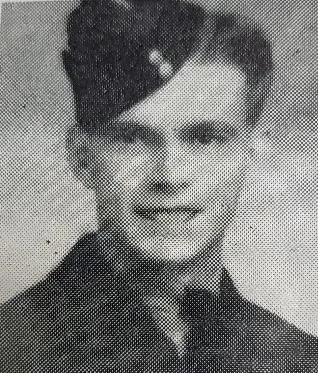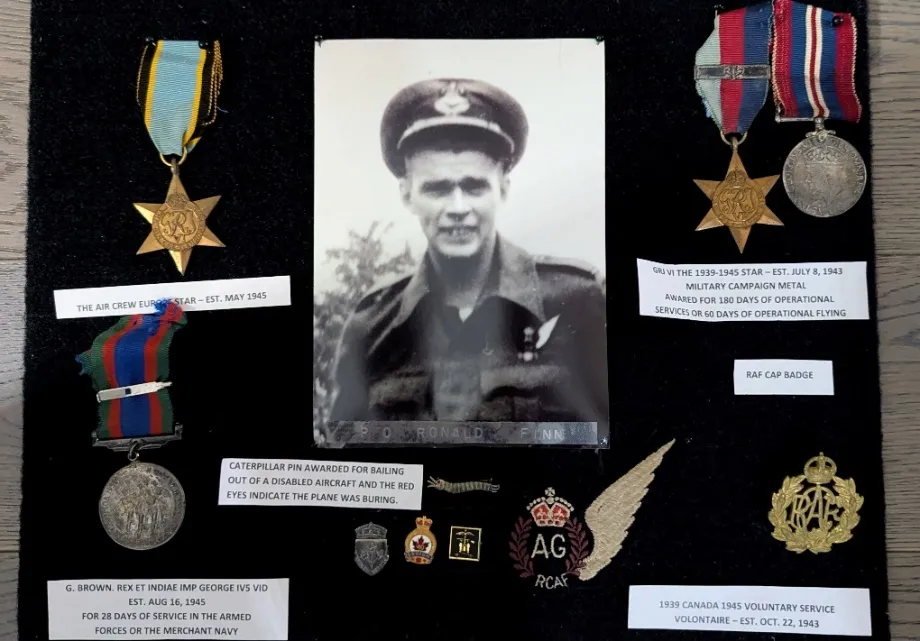7 Queen Street
Ronald Joseph Finn

Ronald Joseph Finn was born in 1923, the son of Mary Irene Rooney and Patrick Finn. Patrick was a Civil Engineer who died in an accident in St. George while working for the CN Railroad in 1927. Irene raised her four children at 7 Queen Street in Paris while living with her parents, Laura and Timothy Rooney. When Patrick (Paddy) Finn was killed the children were all under five years of age. Ron was 4 years old. His younger brother Ted was just 6 months old.
Ron signed up to go into the service at 17 years of age, and being too young to join without parental approval, his mother had to sign to allow him to join. He first served in the Royal Canadian Army Service Corps which would take under-aged soldiers. He received his basic training with the R.C.A.S.C. They provided support to Canadian fighting infantries by moving supplies from the rear areas to the front lines. They delivered all rations, ammunition, petroleum products and all other essentials. He did not go overseas while he was in the army but served in Canada loading trucks.
Ron joined the Royal Canadian Air Force when he turned 18. He trained first at Dunnville and went overseas in September 1943 when he was 20 years old. He was stationed at Bournemouth, a major training centre for recruits. Ron moved through the ranks, first as a Sergeant and then as a Pilot Officer. He served as a mid-upper gunner and went on night raids over Germany.
On March 25, 1944, he and his crew were flying a Halifax Bomber over Germany when they were shot down. The pilot held the plane steady until most of the crew could parachute from the plane. The pilot went down with the plane as well as the rear turret gunner who had become trapped in the plane. Ron was badly injured, tearing tendons and ligaments in his knees, and the crew members were separated from one another. He knew the Germans would be hunting for the survivors, so he stole some clothes, shed his uniform and hobbled away from the area as fast as he could.

On the third day, he boarded a train heading towards the border, but Nazis boarded the train, questioned all the passengers, and Ron was arrested and taken to Leipzig, the town they had been bombing when they were shot down. His fellow crew members had been found as well, and the German soldiers took them to the town square and identified them to the crowd as the soldiers who had bombed their city. They were pelted with rocks and beaten by the crowd before they were taken to a P.O.W. camp in Poland, where Ron would spend the next 14 months.
By this time, the war was turning against the Germans, and their treatment of prisoners was harsh. Prisoners were on a near starvation diet of boiled turnip and tea. Prisoners would steal hard tack biscuits meant for the guard dogs and would catch and eat any stray cats that entered the camp. They were made to go on “forced marches” between camps carrying heavy packs. The intention was to reduce the number of prisoners, and it is estimated that one-third of the prisoners died as a result of this treatment. Ron was a 200-pound man when he went into the camp and weighed 118 pounds when he was released at the end of the war.
When he was finally freed, Ron was 22 years old, though he looked like a much older man. His hair had greyed; his teeth had begun to fall out due to malnutrition. He spent many months convalescing in England and then later in Canada. He did not tell his family he was coming home, and when he reached his family house on Queen Street, carrying his kit bag on his shoulder, there was a joyous reunion as he was welcomed back in the arms of his extended Irish family.
Ron went on to marry Jane Cochrane, and they lived at 16 Jefferson Street, raising their three daughters, Sharon, Martha, and Carol. A few years before he passed, he attended a P.O.W. internment camp reunion, and visited Bournemouth where he was stationed, and he visited the family he boarded with there. He never held a grudge against his captors, and spoke of visiting Germany, but he died in March 1992. He was buried on March 17th, St. Patrick’s Day, very fitting for an Irishman. His family cherish the medals and decorations he earned during the war. They will be passed on through the generations.
Finn Brothers
